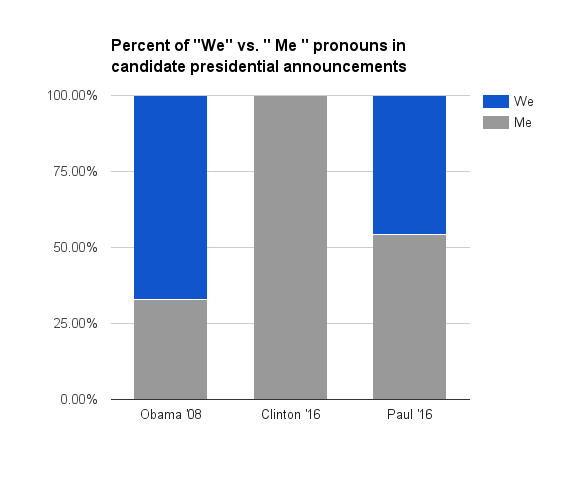There is a running joke about Hillary Clinton: She’s inescapably narcissistic. Need proof? Check out the satirical Onion article released earlier in the week, “Hillary Clinton to Nation: ‘Do Not Fuck This Up for Me.'” Satire employs humor to expose people’s flaws and vices; the Onion post received 110,000 Facebook likes. Clearly people have noticed Clinton’s self-centered streak.
On Saturday—the day before Clinton released the video online announcing her candidacy—Saturday Night Live aired a skit showing a campaign aid coaching Clinton on how to address an online audience. “You said this new campaign is not about you, it’s about the people, so let’s try one where you don’t say ‘I’ or even your own name,” the aid suggests.
Though a playful jab, the message is still clear: Clinton seems to talk about herself—a lot.
Since the 1980s, researchers have looked at the use of first-person pronouns as an indicator of narcissism. A small-scale study in 1988 found that frequency of terms like “I” and “me” correlated to psychological measures of narcissism. Cultural anthropologist point to a rise in “I” statements as an indicator of cultural shifts toward narcissism.
More recent research has called into question whether the link between personal pronouns and narcissism is statistically significant.
Perhaps what the American public is sensing comes from Clinton’s frequency of “me” terminology. So, I decided to count the number of “me” vs. “we” terms in Clinton’s campaign announcement and compare it to Obama’s in 2008, as well as one current Republican challenger, Senator Rand Paul, who announced his candidacy last week.
There wasn’t much of a contest: Clinton’s opening YouTube video is a string of “me” statements—a series of families talking about their individual struggles. And when it gets to Clinton, there’s only more “me” talk.
By comparison, about 65 percent of Obama’s ’08 announcement was “we” statements. Forty-five percent of Paul’s were, too.

But this is nothing new; Clinton’s campaigns seems to have always been more Clinton-centric. In 2008, her opening announcement included, “I’m in. And I’m in to win.”
In contrast, Obama’s was more collectivist:
From the beginning, we’ve urged you to think of this as your campaign; to contribute your ideas, energy and creativity to the mission of ending a war, challenging our broken politics and changing our course. We know the energy for such change will only come from the grassroots—from you—not from Washington.
It’s clear that Clinton is (relatively) more self-referential, and the American public is picking up on it. But are the Onion and SNL right to call it narcissism?
That’s up for debate. More recent research has called into question whether the link between personal pronouns and narcissism is statistically significant. One 2015 study found “little support for the widely assumed and strongly intuitive idea that narcissists stand out by referring to themselves a lot using I-talk,” according to the researchers. In other words, we can’t simply say that Clinton’s “I” talk makes her an inherently more conceited person.
Still, as evidenced by all the parodies in just this first week, even if Clinton isn’t more narcissistic than Obama or Paul (or any other politician), clearly her words still leave an impression.





